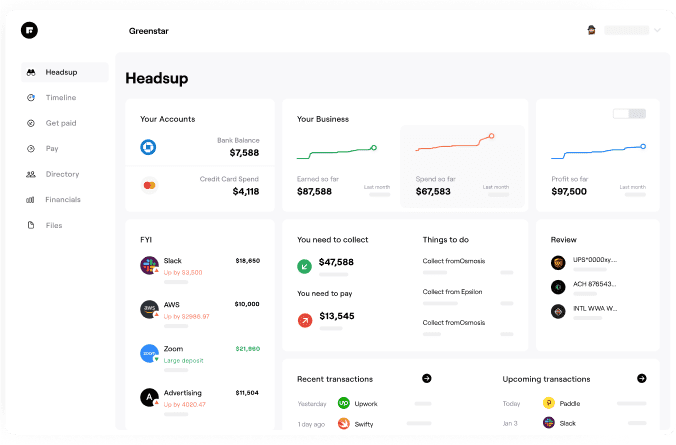
“With great power comes great…”
Got to admit, Uncle Ben was right. As a freelancer, you have the unique freedom to work on your own terms — be your own boss. But that means having to manage your finances effectively, by yourself. You’ve got to keep track of income, expenses, and taxes, manage your cash flow, and stay on top of your business finances. Enter bookkeeping.
Bookkeeping is the process of tracking and organizing financial transactions, including your income, expenses, and taxes. It’s a lot like being an accountant, except you don’t have to wear a stuffy suit. Bookkeeping is especially important for freelancers because it helps you to manage your finances, and ensures that you’re making a profit from all your work.
But let’s face it, as a freelancer, there’s already enough on your plate without having to worry about bookkeeping and taxes. Using software can make managing your finances a whole lot easier. With the right software, you can focus on what you do best – your work!
Bookkeeping: Making cents of your finances!
When it comes to bookkeeping, a little effort goes a long way. It’s not rocket science, but it takes a little time and repetition before you see results. Getting an accurate bird’s eye view of your finances is the goal, so here are some tips to get you started.
1. Track everything
If you can’t track it, you can’t manage it. To stay on top of your finances and avoid unwanted surprises come tax season, you have to track everything. And I mean everything. Whether it’s $10 for a Spotify subscription or $1000 for office rent, every dollar spent needs to be accounted for.
Here’s why you should
Invoicing:
Keeping track of your work hours and project expenses can help you create accurate invoices for your clients. This can help you get paid faster and avoid disputes over billing.
Cash flow management:
Tracking your income and expenses can help you manage your cash flow more effectively. By knowing how much money is coming in and going out, you can make better decisions about when to take on new projects, when to pay bills, and when to save for the future.
Tax compliance:
As a freelancer, you’re responsible for reporting your income and expenses to the tax authorities. If you don’t have accurate records, you could miss out on deductions and credits that could save you money. Plus, if you’re ever audited, having good records can help you prove your case and avoid penalties.
Financial reporting:
If you ever need to apply for a loan or seek investment, having accurate financial records can help you make a stronger case. It can also help you track your business’s performance over time and identify areas for improvement.
Start jotting down your expenses and income like your life depends on it.
2. Personal Vs Professional
If personal expenses are mixed in with business expenses, it can be challenging to distinguish the deductible expenses. This can result in missed deductions and errors on tax returns, which could lead to fines and penalties. It can be challenging to determine how much money is available for the business expense if the two are intertwined.
Mixing personal and business finances can make you vulnerable to legal liability. If a client or partner sues you, they could potentially go after your personal assets as well as your business assets. Keeping personal and business finances separate can help protect your personal assets in case of legal action.
3. Timely invoices and payments
Keep track of payments and invoices in a consistent and organized way, so you know who owes you money when payments are due, and which invoices have been paid. This makes it way easier to keep your books in order and manage your finances.
And, if you ever get audited (fingers crossed you don’t!), having a methodical system in place can make the process much less stressful. You’ll have all your financial records neatly organized and easily accessible, saving you a ton of time and headaches.
4. Bring in the big guns

When it comes to bookkeeping, using software is a lifesaver. Instead of spending hours sifting through invoices and spreadsheets, Fincent can generate detailed reports that show your income and expenses, making it easy to fill out your tax forms accurately and efficiently.
But it’s not just about keeping track of your finances.
Fincent also makes it easy to generate invoices, set up payment reminders, and even accept online payments from clients. No more awkward conversations or chasing down payments – everything is streamlined and automated. Plus, since everything is stored securely in the cloud, you don’t have to worry about losing important documents or data.
Is bookkeeping a whole different ball game for freelancers?
Yes, some nuances only apply to freelancers. You may already have an accountant, but they typically review your finances once a year, usually during tax season. Bookkeeping, on the other hand, gives you an accurate snapshot of your finances every day / every week of the year.
While bookkeeping is a fundamental aspect of financial management for various types of employment, the approach and process differ significantly. This is mainly due to the complexity of taxes and deductions, which vary by the type of employment.
Taxes and deductions for the self-employed
1. Self-employment tax
Freelancers pay a self-employment tax, which is the equivalent of the Social Security and Medicare taxes that traditional employees pay. The self-employment tax is currently 15.3% of your net income (income after expenses have been deducted).
2. Income tax
As a freelancer, you also pay federal and state income taxes. The amount of income tax owed is based on your taxable income (gross income minus eligible expenses).
3. Estimated tax payments
Since freelancers don’t have an employer automatically withholding taxes from their income throughout the year, they are required to pay estimated taxes quarterly if they expect to owe $1,000 or more. Use IRS Form 1040-ES to estimate how much tax you owe each quarter.
Being accurate with your estimated taxes and making your payments quarterly is crucial. If you underestimate your quarterly taxes, you’ll be left owing the balance when filing your tax return (April 18th). Underpay too much and you may be subject to a fine.
4. Home office deduction
Freelancers working from home may deduct a portion of their home expenses, such as rent, utilities, and internet, as a business expense.
In order to be eligible for the home office deduction:
- Your office space must be used regularly and solely for business purposes.
- The home office must be the primary location where your business operates.
5. Business expenses
Freelancers can deduct eligible business expenses, such as travel expenses, office supplies, and equipment purchases, from their taxable income. It’s important to keep accurate records of all business expenses to ensure they are properly deducted.
6. Retirement contributions
Freelancers can contribute to a tax-advantaged retirement plan, such as a solo 401(k) or SEP IRA to both lower their taxable income and save for retirement.
7. Health insurance premiums
Freelancers can deduct their health insurance premiums by itemizing them on their tax return, or pay the premiums directly as a self-employed health insurance premium. Alternatively, expenses on medical billing exceeding 7.5% of your yearly income may also be eligible for the deduction.
Think of bookkeeping as your financial GPS. Without it, you’re driving blind and hoping for the best. But with good bookkeeping, you’ll have a clear view of where you’re at, where you’re headed, and how to get there. Plus, it’s not just about planning for taxes and managing expenses, Bookkeeping gives you a bird’s eye view of your business growth.








